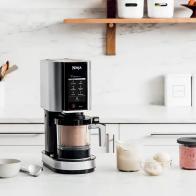How to Store Blueberries
Here, how to store fresh picked blueberries and blueberries from the grocery store.

Nodar Chernishev/Getty Images
Blueberries are some of summer’s most sought-after produce, but luckily, prime berries are available year-round in most grocery stores. Blueberries are versatile, too, adding a berry burst to dishes both savory and sweet, including smoothies, baked goods, salads and sauces. Here, we share our best tips for storing blueberries, whether they’re store-bought or freshly picked, so you can make the most of your harvest.

Bloomberg Creative Photos/Getty Images
How to Pick the Best Blueberries from the Grocery Store or Blueberry Patch
There are few things to keep in mind when selecting fresh blueberries, depending on whether you’re picking them fresh in the blueberry patch or scooping up a container of them at the grocery store.
Grocery Store:
Look for firm, plump blueberries with smooth, dry skins. They should be deep blue-purple to blue-black in color, with a silvery blush. You’ll want to avoid reddish berries as these can be sour (though you can still use them in cooking or baking applications). Avoid any containers with juice stains, which could indicate that the fruit has been bruised in transit or that there are a few berries past their prime in there. You’ll also want to steer clear of blueberries that have leaves or stems and those that show signs of age such as mushiness or wrinkles.
Blueberry Patch:
When picking blueberries in a blueberry patch, look for berries that are plump, have smooth skin and are deep blue with a grayish bloom. If the berries have any red on them, it’s an indication that they’re not yet ripe and will taste sour (though you can still use them in baking or cooking). Avoid picking berries that have white or green on them, as this means they haven’t yet ripened and need to finish ripening on the bush. (If you pick white or green-tinged blueberries, they won’t ripen after they’ve been picked.) Steer clear of wrinkled blueberries or those that are leaking or moldy. Because blueberries are fragile, take extra care when transporting them home: don’t put them in closed bags or containers or expose them to sun or heat.

Cultura RM Exclusive/Danielle Wood/Getty Images
How to Wash Blueberries
If you’re storing blueberries in the refrigerator, don’t wash your blueberries until you are ready to eat them or cook with them. That’s because any excess moisture from washing can cause them to go bad more quickly in the fridge. You will, however, want to rinse and dry blueberries before freezing them.
To clean blueberries, put the amount you need in a colander or strainer and rinse them under cold water. Since blueberries are delicate, keep the water pressure on the lower end (alternatively you can swish them around in a bowl of cool water). Spread them out on paper towels and let them drip dry for a few hours or gently dry with a clean kitchen towel or paper towel.
How to Store Blueberries In the Refrigerator
Refrigerate fresh berries right after grocery shopping or a visit to the blueberry patch. You can store them in the plastic clamshell they come in, or in a large, un-covered bowl or container. Don’t store fresh blueberries in an airtight container as this can trap moisture and speed up mold and rot. It’s best to store blueberries in the main part of the refrigerator rather than the crisper drawer, to allow for better air circulation.

Annabelle Breakey/Getty Images
How to Freeze Blueberries
After you’ve washed and dried your berries, they’re ready for the freezer. To ensure that your blueberries freeze quickly and evenly, and to keep them from clumping together, freeze blueberries in a single layer on a rimmed baking sheet pan (pick a pan that accommodates your freezer size). Freeze the blueberries for about 30 minutes, then transfer to a resealable bag. Remove as much air as possible from the bag, then label with the date and contents. Store the bags flat so that you can stack them.
How Long Do Blueberries Last?
If properly stored, blueberries can last up to 2 weeks in the refrigerator, though to enjoy them at peak flavor and texture, eat them within a week. Blueberries can last up to 10 months in the freezer, though they peak around the 6-month mark.
Related Links:






























































